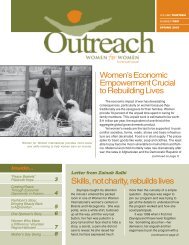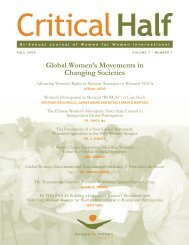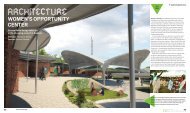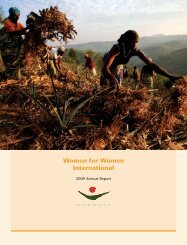Gender and Constitution Building - Women for Women International
Gender and Constitution Building - Women for Women International
Gender and Constitution Building - Women for Women International
Create successful ePaper yourself
Turn your PDF publications into a flip-book with our unique Google optimized e-Paper software.
the case of Iraq where the <strong>Constitution</strong> is being<br />
drafted at a time of reconstruction <strong>and</strong> instability.<br />
� Propose Language <strong>for</strong> the New <strong>Constitution</strong>—<br />
<strong>International</strong> agencies <strong>and</strong> Iraqi lawyers need to be<br />
prepared to offer the <strong>Constitution</strong>al Committee<br />
appropriate language <strong>for</strong> inclusion in the final<br />
document. One newly-elected female parliamentarian<br />
from the United Alliance explained that she<br />
understood the needs of the women but did not<br />
know how to translate the recommendations into<br />
legal language that could convince the Committee<br />
drafting the <strong>Constitution</strong>. A special working group<br />
should be <strong>for</strong>med to take the input from women’s<br />
rights activists or concerned citizens <strong>and</strong> <strong>for</strong>mulate<br />
it in appropriate language <strong>for</strong> the decision-makers.<br />
� Establish Mechanisms <strong>for</strong> Accountability—<br />
Without mechanisms <strong>for</strong> accountability in place<br />
<strong>and</strong> pressure from civil society, the <strong>Constitution</strong><br />
could be drafted behind closed doors. Civil society<br />
must take the initiative to craft the mechanisms of<br />
accountability <strong>and</strong> develop ways to apply pressure<br />
to the decision-makers. This includes creating a<br />
parallel process of shadow committees that track<br />
the developments of the constitutional process <strong>and</strong><br />
provide input. There should be strong pressure <strong>for</strong><br />
both the press <strong>and</strong> members of civil society to have<br />
access to the TNA <strong>and</strong> receive updates <strong>and</strong> an<br />
opportunity <strong>for</strong> dialogue with the <strong>Constitution</strong>al<br />
Committee. Similarly, women’s rights defenders<br />
should develop a plan of action if the draft<br />
<strong>Constitution</strong> does not meet their approval, including<br />
a plan <strong>for</strong> how to mobilize the community <strong>for</strong><br />
the October 2005 referendum when the <strong>Constitution</strong><br />
will be put <strong>for</strong>ward <strong>for</strong> a popular vote.<br />
� Increase Citizen Participation—In the past, the<br />
responsibility <strong>for</strong> drafting constitutions was<br />
confined to the elite <strong>and</strong> educated classes. However,<br />
history has shown that the process of creating a<br />
constitution is itself the true value added to the<br />
legitimacy of the final product. Because a new<br />
constitution is a new social contract, avenues <strong>for</strong><br />
citizen participation must be developed. This<br />
responsibility will most likely fall to the leaders of<br />
civil society. However, due to the rapid timeline <strong>for</strong><br />
drafting the Iraqi <strong>Constitution</strong>, the restrictions<br />
caused by lack of security <strong>and</strong> the immense task<br />
be<strong>for</strong>e the TNA <strong>and</strong> <strong>Constitution</strong>al Committee,<br />
many leaders will be tempted to simplify the<br />
process by limiting negotiations <strong>and</strong> citizen input.<br />
This can be a fatal mistake, not only reducing<br />
transparency in the process <strong>and</strong> truncating public<br />
participation, but endangering ultimate acceptance<br />
of the <strong>Constitution</strong>, which cannot be passed<br />
without a referendum. If the <strong>Constitution</strong> is not<br />
passed, the TNA will be dissolved, a new parliamentary<br />
election must be held <strong>and</strong> Iraqis will find<br />
themselves back to the drawing board. Even if the<br />
<strong>Constitution</strong> were to pass, limiting the input of the<br />
public during the drafting stage would be missed<br />
opportunity <strong>for</strong> engendering wide support <strong>for</strong> <strong>and</strong><br />
commitment to the new laws. There<strong>for</strong>e, it is in<br />
the interest of all groups to ensure there are<br />
avenues <strong>for</strong> citizen participation in the process at<br />
the grassroots level. Including the public in the<br />
process will help ensure a stronger sense of<br />
ownership between the citizen <strong>and</strong> the <strong>Constitution</strong>.<br />
This is particulary important <strong>for</strong> women’s<br />
rights defenders, as shown by the January 2005<br />
elections where the real influence came from those<br />
with access to voters at the grassroots.<br />
� Ensure that Leaders Are Committed to a<br />
Bottom-Up Approach—The primary success<br />
stories involving progress <strong>for</strong> women’s rights in<br />
the region have occurred due to the support of<br />
people in a position of authority. For example,<br />
Egypt’s First Lady Suzanne Mubarak publicly<br />
endorsed the idea of female judges at a September<br />
2002 convention of the ruling National Democratic<br />
Party. The Supreme Council of <strong>Women</strong> in<br />
Bahrain was established by royal decree <strong>and</strong> is<br />
directed by the First Lady, Her Highness Shaikha<br />
Sabika bint Ebrahim Al-Khalifa. The injustice of<br />
honor crimes could never have been addressed in<br />
Jordan if it were not <strong>for</strong> the support of Their<br />
Majesties King Abdallah <strong>and</strong> Queen Rania. Iraq’s<br />
new First Lady, Hero Talabani, has already shown<br />
her support <strong>for</strong> women <strong>and</strong> children in the<br />
independent Northern Kurdish area of Iraq.<br />
Re<strong>for</strong>m can only take place when it is supported<br />
<strong>and</strong> protected through a commitment from highlevel<br />
leadership.<br />
Conclusion<br />
The challenge of bridging the gap between what is<br />
preached <strong>and</strong> what is practiced can only be achieved<br />
through time, citizen participation <strong>and</strong> the commitment<br />
<strong>and</strong> support of leaders. It is a long-term challenge. The<br />
development of <strong>and</strong> referendum on a new <strong>Constitution</strong><br />
are only the first steps in building public participation<br />
<strong>and</strong> commitment to the rule of law in the new Iraq.<br />
Moreover, the legal precedent <strong>for</strong> women as equal citizens<br />
must be set <strong>and</strong> women’s rights in the new <strong>Constitution</strong><br />
ensured. <strong>Women</strong>’s ef<strong>for</strong>ts to guarantee their equal<br />
rights under the law will positively affect not only their<br />
CRITICAL HALF 49







